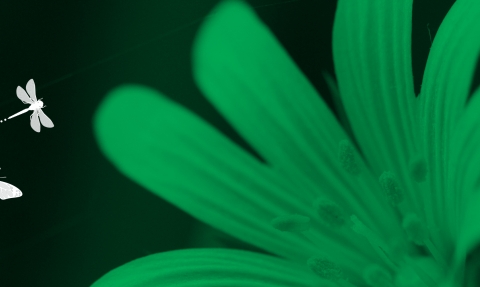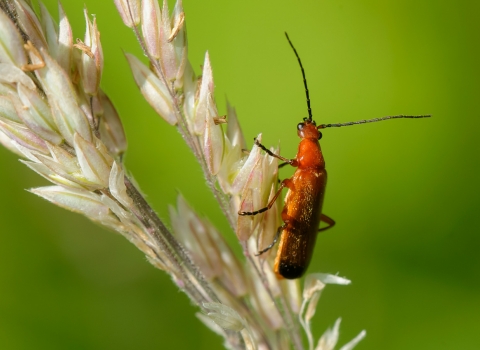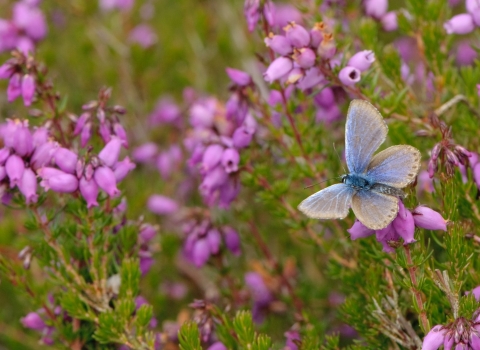
Action for Insects
"We are witnessing the largest extinction event on earth since the dinosaurs"
Insects are dying out up to eight times faster than larger animals and 41% of insect species face extinction.
This is a serious cause for concern - insects pollinate a third of our food crops, and are the main food source of many birds, small mammals and fish. Their demise impacts us all as well as our wildlife.
Loss of insect habitats and overuse of pesticides are two of the major causes of this impending devastation. However, it is not too late to act.
Insect populations can recover, and we know what needs to be done to save them.
By working together we can change the future of insects. Help tackle this crisis with a free guide on action you can take today.

Red Soldier Beetle © John Bridges
How can we reverse insect declines?
Read the reportFind out why insects are dying out at such an alarming rate - and how together, we can stop it.
This report by Professor Dave Goulson summarises some of the best available evidence of insect declines and proposes a comprehensive series of actions that can be taken at all levels of society to recover their diversity and abundance. Read the report here.

Silver-studded blue butterfly (Plebeius argus) worn male at rest on bell heather (Erica cinerea). © Chris Gomersall/2020VISION
Five reasons why we should care
Without insects many birds, bats, reptiles, amphibians, small mammals and fish would die out as they would have nothing to eat.
87% of all plant species require animal pollination, most of it delivered by insects - that is pretty much all of them except grasses and conifers.
In addition, 3 out of 4 of all crops that we grow require pollination by insects.
Only by working together can we address the causes of insect loss, halt and reverse them, and secure a sustainable future for insect life and for ourselves.
Together, we can stop this looming catastrophe and create an environment that is rich in nature for the benefit of wildlife and people.
Take action for insects in your community
Tell me more
The Wildlife Trust's position on pesticides and wildlife
Don't farmers need pesticides to grow enough food?
In many parts of Britain, traditional family farms have given way to large agri-businesses, typified by large fields, often managed by external contractors, maintained as near perfect monocultures by high inputs of pesticides and fertilizers.
The result is a landscape that produces more food, more cheaply, than it used to, but is largely inhospitable to wildlife and provides employment for very few people. The low price of food on the supermarket shelves that we have become used to does not reflect the true environmental costs of its production. It is also important to note that farmers only receive a fraction of the retail sale price of food, so the cost of improved on-farm practice would have a relatively small impact on shoppers.
Recent studies from France estimate that total pesticide use can be reduced by 42% without significant reductions to yield or profit
France is one of the biggest consumers of pesticides in Europe (per unit of agricultural area). In 2013, after controversy over levels of pesticide concentration in drinking water, the French government set a target of a 50% decrease in pesticide use, promoting the principles of agroecology and advocating integrated management of pests for a reduction of pesticide reliance.
Food security and economic impacts were a major consideration for policy advisors and researchers:
“We demonstrated that low pesticide use rarely decreases productivity and profitability in arable farms. We analysed the potential conflicts between pesticide use and productivity or profitability with data from 946 non-organic arable commercial farms showing contrasting levels of pesticide use and covering a wide range of production situations in France. We failed to detect any conflict between low pesticide use and both high productivity and high profitability in 77% of the farms.” Lechenet et al. 2017
How do I stop my plants and vegetables being eaten if I don't use pesticides in my garden?
Gardening without harmful chemicals is a good way to ensure that the food and plants you grow are pesticide free and can still thrive without using products that are harmful to our wildlife. If you’ve used chemicals in the past, this might sound like an invitation to every pest for miles around to shred your garden ... and that might well happen at first. But, with time and patience, you’ll end up with a rewarding, healthier garden for ditching the chemicals.
Spraying to deal with pests can often kill the predators too, or at least make them want to avoid your garden. When you stop using chemicals, aphids are the first creatures to return as they have a short breeding cycle. Their predators may take longer to come back, but stick with it and know it will be better in the long run! Our Action for Insects for the home has lots of advice and tips for how you can garden without chemicals including advice on companion planting and alternatives to chemicals.
In the end you’ll wonder why you ever needed chemicals in the first place.
We can't turn the clock back to how things used to be so what can we do today?
Gardening without harmful chemicals is a good way to ensure that the food and plants you grow are pesticide free and can still thrive without using products that are harmful to our wildlife. If you’ve used chemicals in the past, this might sound like an invitation to every pest for miles around to shred your garden ... and that might well happen at first. But, with time and patience, you’ll end up with a rewarding, healthier garden for ditching the chemicals.
Spraying to deal with pests can often kill the predators too, or at least make them want to avoid your garden. When you stop using chemicals, aphids are the first creatures to return as they have a short breeding cycle. Their predators may take longer to come back, but stick with it and know it will be better in the long run! Our Action for Insects for the home has lots of advice and tips for how you can garden without chemicals including advice on companion planting and alternatives to chemicals.
In the end you’ll wonder why you ever needed chemicals in the first place.
What pressure is being put upon the Government to act?
The Wildlife Trusts and our Greener UK partners are campaigning for UK Government to pass new laws that will not only protect but will also help to restore green spaces and wild places. We want a Nature Recovery Network enshrined in law to:
· protect existing wildlife sites and map out where wildlife ought to be, joining up important places for wildlife, while ensuring more people can live closer to nature
· Set targets for environmental improvement and nature’s recovery;
· Require plans to be produced to integrate national and local regulation, spending, investment and action. You can find out more about our Wilder Future campaign here.
Become a member of Dorset Wildlife Trust
Be part of a community of like-minded people fighting for Dorset's wildlife
